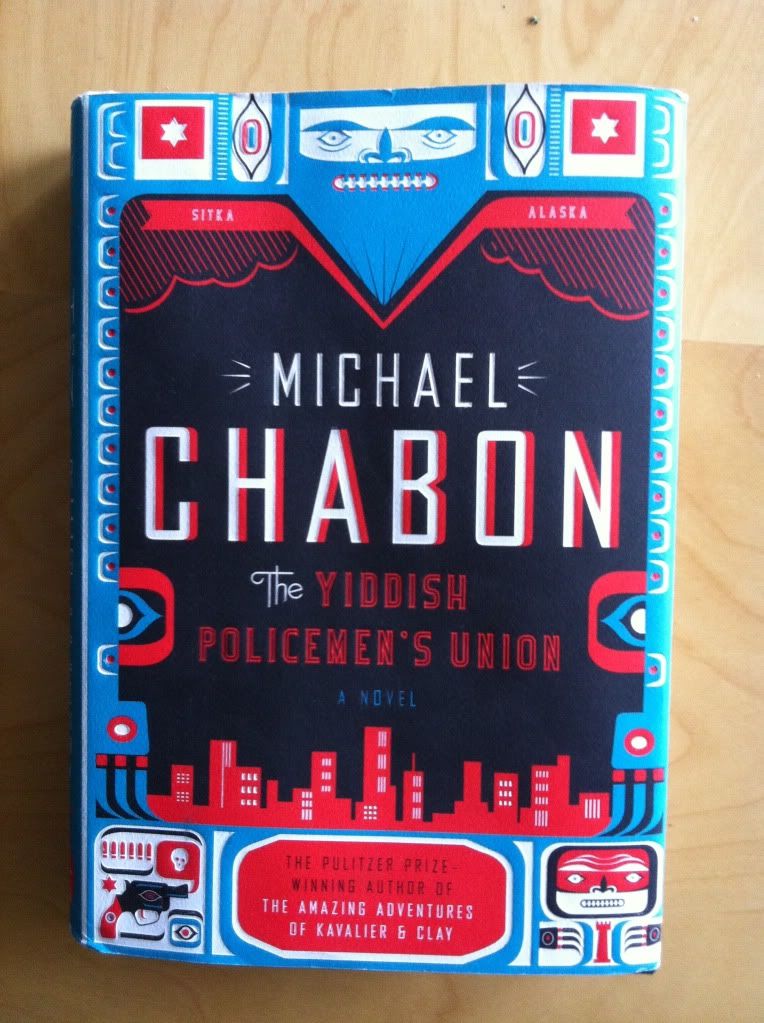Or why you should read The Yiddish Policemen's Union by Michael Chabon
The Yiddish Policeman's Union is a novel constructed with many discrete components, pilfered and lovingly repurposed from many different genres to create this remarkable new whole.
The underpinnings of the story are pure speculative fiction. The Yiddish Policemen's Union changes a single moment in time, killing Anthony Dimond, an Alaskan delegate to the US Congress. As a result of this man's death, the novel presents an alternate history where the United States took up the Slattery Report of 1940 and created a temporary settlement for European Jewish refugees in Alaska. As a result the Holocaust kills two million jews (instead of the six million murdered in reality) with millions of jewish refugees resettling in Sitka, Alaska. In addition to this, and perhaps indirectly as a result, the establishment of Israel in 1948 is followed almost immediately by its complete destruction in an alternate version of the Israeli-Arab war. The Yiddish Policemen's Union, then, portrays a modern world where the majority of Jewish people live in Sitka Alaska, a defacto Israel of exiles whose ownership of the land is only temporary and tentative.
Plotwise, The Yiddish Policemen's Union is constructed out of the pulpiest bits of detective fiction. In the book, down-on-his-luck detective Meyer Landsman is drawn into solving the murder of a junkie in the flop hotel in which they both live. Landsman and his half-Tlingit, half-Jewish partner and cousin Berko Shemets try to decipher the apparently professional assassination of a man with only a partially solved chess game as a clue to go on. Along the way Landsman must contend with his alcoholism, his self-destructive depression, his grief over his sister's death in an airplane accident, his hatred of chess, the internecine and elaborate relationship between subdivisions of the Jewish community, and his feelings for his superior officer and ex-wife Bina Gelbfish. And Landsman must solve all of this with the looming deadline of Revision because the outcome of this case will have ramifications for the very future of the Jews of Sitka.
The novel thematically, is almost a treatise on the Jewish diaspora experience told in that great, rich, Jewish storytelling tradition. The Yiddish Policeman's Union begins just before Revision, the end of the sixty year land grant given to the Sitka Jews. As a result the characters of the novel are living on borrowed time, in a nation that does not want them surrounded by a displaced Tlingit nation that would see them gone. As a result, Landsman and his fellow Sitka Jews don't really have a home, no Israel with its Right of Return, no continuation or normalization of their temporary homeland. They are unwanted and adrift in a way that seems to resonate with Jewish history in this fundamental way. (And of course, Landsman himself is homeless in this whole other way, adrift within his community and cutoff from his relationships.) So really, as much as the Yiddish Policeman's Union is a work of Science Fiction and a detective tale, it is more than anything a parable about the search for a home.
The way in which The Yiddish Policemen's Union combines these radically different elements makes for a startlingly detailed, uncanny new thing. It's a novel with the richness of language and embellished complexity of a Jewish grandfather's story paired with the broad swashbuckling action and eyebrow shrugging smarm of the best detective serials. It's at once new with the frontiers of Alaska and ageless as the Torah. It has the well researched air of the meticulous speculation but also the effortless sense of a story being told, casually, in the moment. The Yiddish Policemen's Union is weird and heartfelt and tense and a glorious mulatto of ideas and genres.
I would recommend the Yiddish Policemen's Union to a pretty wide swath of readers. It's an excellent detective story that should appeal to any fan of the genre. It has an inherent pulpiness that, I think, has a common genetic element with Superhero comics, which should make this a novel that comic fans will enjoy. It's Science Fiction elements are quietly brilliant and worth a look by anyone who enjoys a good alternate history book (your Man in The High Tower, for instance). The sheer story-ness, the way the tale is woven, I think would also appeal to fans of oral storytelling and the most NPR of radioshows. The Yiddish Policemen's Union also a very literary novel, with an elegance and profoundness to its prose that should appeal to even the most picky of critical readers. Basically, the very hybrid nature of The Yiddish Policemen's Union, should make it accessible to pretty much anyone. I highly recommend it.

No comments:
Post a Comment